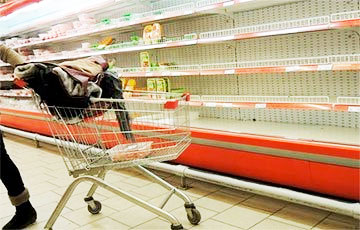Shelves Of Belarusian Stores Grow Empty And Poor
12- 18.07.2022, 11:00
- 20,484

Foreign companies are leaving the country.
The changing political and economic reality has caused a transformation in the markets of everyday goods in Belarus. Despite the lack of empty shelves in stores, many consumers complain about the limited range of goods, writes ilex.by.
Experts believe sanctions, breakdown of the usual supply chains and lower purchasing power of the population have caused this. However, market participants note there is no deficit at the level of product categories in Belarus, but it exists at the level of brands.
Following the events in Ukraine, many Western companies announced their withdrawal from Russia or suspended operations on the Russian market. The range of goods in the stores began to shrink against the background of import reduction.
The Republic of Belarus also fell under restrictions: a number of multinational companies suspended operations not only in the Russian market but also in Belarus. They either suspended shipments of new goods or reduced their marketing activity.
For example, the leading electronics suppliers such as Samsung, Apple, ASUS, Dell, Lenovo, Toshiba, and NVIDIA did it. One should note that a significant part of goods had previously been shipped to Belarus from Russia, where international corporations have their production facilities.
Head of the online hypermarket 21vek.by Sergey Vainilovich says the range was reduced to 85% of the planned one due to the sanctions. He says there is a situation in the market when vendors do not have enough goods from foreign brands that left the market. They have to be imported in parallel, which affects the prices. There is a high demand for household appliances and electronics. There is a fight not for a buyer but a supplier. Unfortunately, there is no competition for demand, says the top manager.
Along with the Western sanctions, there are Belarusian countermeasures. The food embargo is valid until the end of 2022. In addition, there is a ban on imports of products of Beiersdorf (brand Nivea, Florena, etc.), Skoda Auto, Liqui Moly until November 4.
Ukrainian manufacturers also occupied a significant share of domestic store shelves. The events in Ukraine brought about a new economic reality: the products of Ukrainian manufacturers disappear from the shelves of Belarusian stores.
Belarusian producers are adjusting their assortment as well. Companies have to cope with higher prices and longer terms of logistics, lack of raw materials and materials. Given the decline in purchasing power of the population, as well as shortages of packaging, paint and a number of ingredients, keeping a wide range of products is a luxury. In addition, consumers are becoming less demanding of the variety of products on shelves and are more sensitive to prices.
Valentin Sokolovsky, Business Development Director of Datatile in Russia and Eastern Europe, says the trend for reducing the range of products in Belarus began as early as 2021.
- The financial reserve of retailers did not allow them to retain a large list of goods (primarily premium goods) against the background of declining purchasing power of the population. Last year, this was visible in Korona and Green. Now, other retailers are experiencing this," said Valentin Sokolovsky.
In addition, the expert reminds many Western companies have announced their withdrawal or decline in the markets of Belarus and Russia. Another important aspect is logistics.
- Supplies from Europe go to Belarus either by coupling or bypassing routes. In both cases, the time and price of delivery increase. Here the networks themselves begin to speculate whether the products spoil when they get to Belarus. Or the price becomes very high. It will be impossible to sell the goods.
As for the sanctions and restrictions, they do not apply to the whole world. Not all countries and regions have turned their backs on Belarus - Turkey, Egypt, Latin America, China and other countries continue to cooperate with Belarus. Therefore, one can almost always find an alternative to the goods and brands that have left the country. It's just a matter of cost and quality and shipment time.
The expert claims the reduction of the range is more relevant for non-food products. According to statistics, Belarusian products occupy a large share of the shelves (70-90%, depending on the category). Non-food products are another matter. Even if we take Belarusian washing powders, for example, the share of imported ingredients is also high.
- Two things save the situation. Firstly, non-food products have a long shelf life and turnover. Moreover, the retail chains have correctly figured out the situation and added to the stocks, which they can now sell out. So one can't do that with bananas, but it's fine for diapers. However, if one looks at prices of non-food products, they have risen much more than those of food," says Sokolovsky.
The withdrawal of foreign companies from the market "indirectly affects prices" because there is less competition. Manufacturers and retailers had to update price barriers - those thresholds of prices for goods, which customers are psychologically accustomed to, and at the crossing of which there is a sharp drop in sales.
- Cuts in marketing budgets, allocated for promotions and so on, had a much greater impact on the average price. Promotions disappeared or decreased in time and discount size. At one time, there were categories in Belarus, such as detergents and diapers, which were sold through promotions of up to 70% of the volume.
As for overpricing due to the withdrawal of some producers and the appearance of free niches, everybody, from producers to retailers, understands that the purchasing power is decreasing. That's why it is not in their interests to raise prices. Otherwise, people will either refuse to buy or look for a substitution. Prices can be high in one store, but the consumer finds an alternative in another store or on the Internet.
illustration photo










